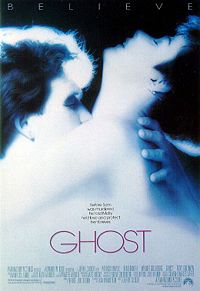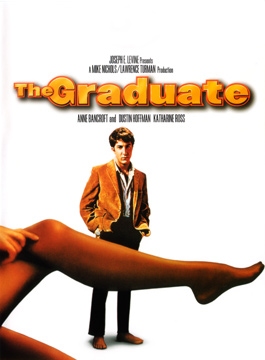
Ghost is a 1990 romantic fantasy film starring Patrick Swayze, Demi Moore, Tony Goldwyn and Whoopi Goldberg, written by Bruce Joel Rubin and
directed by Jerry Zucker. It was nominated for
multiple Academy Awards,
including Best Picture, winning for Best Original
Screenplay, as well as Best Supporting
Actress for Whoopi
Goldberg.
On the television program Siskel & Ebert the
film received a split review, Roger Ebert gave the film a "thumbs down" rating
and said the film was "unintelligent and corny" while Gene Siskel said the film was "flawed but rich and
romantic" and recommended it.[1] The film grossed over $200 million in the
US,[2] and $500 million worldwide and currently has a
score of 78% on Rotten
Tomatoes.
[edit] Academy Award Honors
- Best Actress in a
Supporting Role (Whoopi Goldberg) - Best Writing,
Screenplay Written Directly for the Screen - Nomination: Best Film Editing
- Nomination: Best Music, Original
Score (see Ghost soundtrack) - Nomination: Best Picture
Goldberg's character, Oda Mae Brown, was ranked 95 on the list of the best
movie characters of all time by Premiere Magazine. [1]
https://en.wikipedia.org/wiki/Ghost_(film)

Based on the novel The Cup and the
Sword by Alice Tisdale Hobart, this drama examines the trials and
tribulations of three generations of French-American California
vineyard owners. It's set during the Prohibition era, when wine makers
were financially challenged and had to decide whether or not they
wanted to cooperate with bootleggers to survive. Claude Rains plays Philippe Rambeau, an older grower in the Napa Valley who approaches his work like a craftsman. His grandson John (Rock Hudson) wants to make money by getting the family a cut of the bootleg market for wine. John's cousin Elizabeth (Jean Simmons)
arrives from England summoned by Philippe, who hopes that she will
bring stability to the business. John and Elizabeth fall in love, but
Elizabeth soon finds that her cousin is reprehensible. The ruthless
John sends raiding parties to damage his competitors -- and rapes and
impregnates a field worker. ~ Michael Betzold, All Movie Guide
https://movies.msn.com/movies/movie-synopsis/this-earth-is-mine/

Camelot is the 1967 film version of the successful musical of the same name. Richard Harris appears as Arthur, Vanessa Redgrave as
Guenevere and Franco Nero as Lancelot. The film was directed by Joshua Logan. Â
It tells the story of the break-up of the mythical kingdom of Camelot, due in large part to the love affair of Guenevere and Lancelot.
The film won three Academy Awards for Best Art Direction-Set
Decoration, Best Costume Design, and
Best Music-Scoring of Music (Adaptation or Treatment). It was also
nominated for Best Cinematography and Best Sound. It also won
three Golden
Globe Awards and was nominated for an additional three.[citation needed]
The film is also notable as the only instance in which a song written for a
Broadway show won a Golden Globe award. The category it won in, Best
Original Song Written for a Motion Picture, is reserved only for songs
explicitly written for films, not stage musicals, but in this instance, an
exception was made, and the song If Ever I Would Leave You (mislabeled
If Ever I Should Leave You on the award) won the Golden Globe that year.
Whether this was an accidental oversight on the part of the Foreign Press
Association, or a deliberate attempt to circumvent the rules, is unknown, but it
had not ever happened before, and has not happened since.
It is understood, though never explicitly stated, that Tom, the boy in the
final scene, is Sir Thomas Malory, who would go on to write
the great classic Le Morte d'Arthur. It is stated in the
book The Once and Future King where
Arthur notes that Tom wears the Malory coat of arms, looking absurdly new.[citation needed]
"Guenevere" finally married "Lancelot". Franco Nero (Lancelot) married
Vanessa Redgrave (Guenevere) in 2006.
Lancelot's singing voice was dubbed by noted Los Angeles session singer, Gene
Merlino.
https://en.wikipedia.org/wiki/Camelot_(film)

Splendor in the Grass, an American movie from 1961, tells a story of sexual repression,
love, and heartbreak. Written by William Inge, who appears briefly as a Protestant
clergyman, the film was directed by Elia Kazan.
The film is based on people whom Inge knew while growing up in Kansas in the
1920s. He told the story to director Elia Kazan when they were working on a production of
Inge's play The Dark at the Top of the
Stairs, in 1957. They agreed that it would make a good film and that
they wanted to work together on it. Inge wrote it first as a novel, then as a
screenplay.
The film's title is taken from a line of William Wordsworth's poem "Ode on
Intimations of Immortality from Recollections of Early Childhood":
Natalie Wood was nominated for an Oscar for her role while Inge won for his screenplay adapted from his novel.
https://en.wikipedia.org/wiki/Splendor_in_the_Grass

The Graduate is a 1967 American comedy/drama/romance film directed by Mike Nichols, based on the novel of the same
name by Charles Webb,
who wrote the piece shortly after graduating from Williams College. The screenplay is by Calder Willingham and Buck Henry, who makes a cameo appearance as
the hotel clerk. The film tells the story of Ben Braddock (played by Dustin Hoffman), a recent
university graduate with no
well-defined aim in life, who is seduced by Mrs. Robinson (Anne Bancroft) and then falls in love with her
daughter Elaine (Katharine
Ross).
In the promotional poster for the film, Mrs. Robinson's leg is not that of
Anne Bancroft, but of the then-unknown model Linda Gray — most famous for playing Sue Ellen Ewing in the
television soap Dallas. Linda Gray went on to play the role of Mrs. Robinson
in the stage version of The Graduate in the West End and on Broadway.[1]
A.D. Murphy of Variety and Roger Ebert of the Chicago Sun-Times praised the film upon
its release with Murphy describing it as a "delightful satirical
comedy-drama"[2] and Ebert claiming it was the "funniest
American comedy of the year".[3]
Hoffman earned an Oscar nomination for his
performance as did Bancroft and Ross.
Along with the acting nominations, the film also received nominations for
Best Cinematography,
Best Adapted
Screenplay, and Best Picture. Mike Nichols won the Academy Award for Best
Director.
The film won the BAFTA Award for Best Film, as well as
the BAFTA Award for Best Editing (to
Sam O'Steen).
The film was placed #18 on the List
of highest-grossing films in the United States and Canada (adjusted for
inflation). In 1996, The Graduate was selected for preservation in the
U.S. National Film Registry by the Library of
Congress as being "culturally, historically, or aesthetically
significant".
For the film's thirtieth anniversary reissue, Roger Ebert reversed his
opinion on the film.[4] He, along with Gene Siskel, gave the film a mediocre review on the
television program 
Siskel & Ebert.[5]
https://en.wikipedia.org/wiki/The_Graduate
Â



Love Is A Many Splendored Thing
An Affair To Remember (the version with Deborah Kerr & Cary Grant)
A Star Is Born (Judy Garland)
Gone With The Wind
Now Voyager